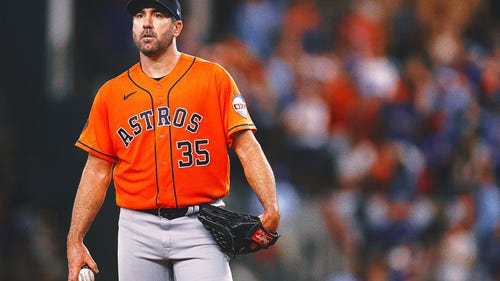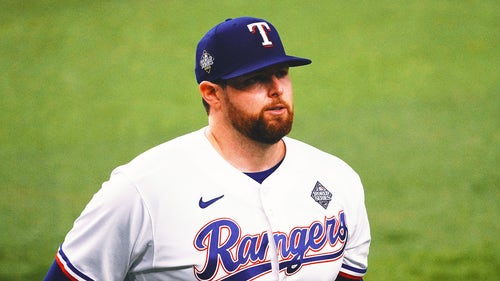
Postseason pressure can bite baseball's best
Mark Teixeira swings at a pitch near his eyes for strike three. Chase Utley makes a wild throw into the stands. Hideki Matsui freezes on a popup and gets doubled off first base. Sometimes it's hard to fathom: the dropped balls, the baserunning blunders, the embarrassing at-bats. Hey, this is the postseason, these guys are supposed to be baseball's best! But playoff pressure can create all sorts of jitters. And even at this level, elite players make the most elementary mistakes. "Sometimes even on the biggest stage you tend to lose it," New York Yankees outfielder Johnny Damon said. "It's tough. We've been playing this game a long time and we understand what is at stake. The focus can get lost." With players pressing so hard to succeed in October, desperate for that championship ring, sometimes it seems they try to do too much out there. Never has that been more evident than this season. The first two playoff rounds produced enough bad baseball to fill a blooper reel. Sometimes, major league All-Stars looked as though they could use a couple of primers on the game's fundamentals from those 12-year-olds at the Little League World Series. "When you're in the postseason, you get a little extra click of adrenaline. There's more on the line, and it can either help you or hurt you," said Phillies closer Brad Lidge, who's had his share of success - and failure - in October. "I think with our guys, it ends up helping them because they're very confident and relaxed and use that extra boost to help their ability." Not so for everyone. Earlier this postseason, Minnesota's Carlos Gomez and Nick Punto made costly mistakes on the bases. Bobby Abreu had a similar miscue in the AL championship series for Los Angeles. Thinking triple, he went too far around second and was thrown out in a crucial situation. In fact, Abreu and the Angels committed a slew of ugly errors in the field and on the bases during their six-game loss to New York. And they're considered one of the sharpest teams in the game. "You just have to move on, be strong about it because mistakes happen. That's not the whole reason of why teams lose. I think just because it's the magnitude of a game, it gets the headline of the front page," Angels third baseman Chone Figgins said. "Guys come and give you a pat on the back, but that's just being good teammates. That's all you can do about it." National Leaguers had their playoff troubles, too. Matt Holliday dropped a sinking liner in left field, costing the Cardinals a victory. Colorado closer Huston Street and Los Angeles' Jonathan Broxton squandered save chances. Utley threw away a pair of double-play balls for Philadelphia in the first two games of the NLCS. "You really have to have a 'so-what' attitude," Phillies Hall of Famer Mike Schmidt explained in an e-mail. "You have to believe you gave it your best and that was all you had. You must learn from the failure and figure out a way to relax." Schmidt knows both sides. He was the World Series MVP in 1980 against Kansas City, then went 1 for 20 when the Phillies lost the '83 Series to Baltimore. "If you hit early it steamrolls into bigger things, relaxes you. You feel a part of it all, you want the big-stage at-bat," he wrote. "The opposite is failing in key at-bats, reading and hearing about it and trying to make up for it with every swing. The pressure builds with each failure. You feel uneasy, like you're letting the team and town down." Umpires haven't been immune this postseason, either. A string of blown calls led Major League Baseball to assign only umps with previous World Series experience to this year's Fall Classic. Usually, however, it's the gaffes by players that get remembered. "There's a lot of emotions that go into these games. Can players try to do too much? Absolutely," Yankees manager Joe Girardi said Thursday. "You have to learn how to bounce back. Sometimes the more a guy has experienced, he'll bounce back maybe a little bit easier. But then you have those free spirits that are able to always put yesterday behind them." Indeed, the ability to overcome mistakes in October - quickly - can be the key to success. Utley is a perfect example. He went 0 for 4 with four strikeouts in his first postseason game two years ago. But he reached base safely in the next 26, setting a big league record, and his two home runs Wednesday night helped Philadelphia beat the Yankees 6-1 in the Series opener. "Failure is a part of this game. You have to learn how to deal with it at a young age if you want to stay sane," Utley said. "For me, as big of a game as these games are, you try to really treat it like just another game." Isn't that difficult to do? "Not really. I guess it could be at times. But it is just another game," he said. "You're going to get another chance, whether it's in the field or whether it's at the plate. So you always want to stay positive. And the more positive you are, the more confident you are, I think the better you do." ---












































































































































